

7 Essential Emotional Support Animal Laws California Residents Must Know
by Lena Park
Last updated: May 6, 2025
Verified and Approved by:
Angela Morris,
MSW, LCSW
Fact Checked

Overview
The article titled “7 Essential Emotional Support Animal Laws California Residents Must Know” serves a vital purpose: to support California residents by informing them about the important laws and regulations that protect emotional support animals (ESAs).
Many individuals face emotional challenges, and understanding these legal protections can significantly impact their lives.
The California Fair Housing Act and recent legislative updates play a crucial role in ensuring that individuals with ESAs can live and travel freely with their beloved companions, free from discrimination.
It is essential to recognize the significance of knowing and advocating for these rights, as they provide a sense of security and belonging.
By understanding these laws, residents can navigate their emotional journeys with confidence and support.
Introduction
Navigating the complex landscape of emotional support animals (ESAs) in California can be a daunting journey for those seeking the comfort and companionship these animals provide. Many individuals face emotional challenges that can feel overwhelming, especially in light of recent legislative changes and a growing awareness of mental health issues.
Understanding the rights and responsibilities associated with ESAs is essential now more than ever. Have you ever felt isolated in your struggles? Obtaining a legitimate ESA letter can be a beacon of hope, helping to advocate for your housing rights under the Fair Housing Act.
It’s crucial for California residents to equip themselves with the knowledge needed to combat discrimination and ensure their emotional support needs are met. This article will explore the key aspects of ESA regulations, the legal distinctions between service animals and ESAs, and the practical steps you can take to secure your rights in a state that increasingly recognizes the importance of emotional support in fostering mental well-being.
Remember, you are not alone on this journey; support is available to help you thrive.
Wellness Wag: Streamlined ESA Letter Services for California Residents
At Wellness Wag, we understand the emotional struggles that many individuals face, especially those dealing with mental health issues. Finding support can be challenging, and that’s where Emotional Support Animal (ESA) letters come in. Our user-friendly platform is designed specifically for California residents seeking letters related to emotional support animal laws California. The process starts with a brief assessment to determine eligibility, followed by a personalized consultation with licensed medical professionals. Once approved, clients receive their official ESA letter within just 24 hours, ensuring timely assistance when it’s needed most.
After placing an order, clients will receive a confirmation email detailing their purchase. If this email doesn’t arrive, we encourage you to check your spam folder or reach out to Wellness Wag directly. This service is essential for individuals facing housing limitations due to mental health challenges, as it provides the necessary documentation to advocate for their rights under the Fair Housing Act and Air Carrier Access Act, in accordance with emotional support animal laws California. In 2025, California has seen a significant increase in the issuance of ESA letters, with reports indicating a rise of over 30% compared to the previous year. This trend reflects a growing acknowledgment of the emotional support that animals can provide. Recent legislative updates, such as Assembly Bill 462, underscore the importance of legitimate ESA letters in compliance with emotional support animal laws California by establishing stricter regulations on their issuance. This law aims to protect the rights of authentic ESA possessors while curbing fraudulent claims, ensuring that licensed professionals maintain a genuine relationship with clients and conduct thorough evaluations.
At Wellness Wag, our commitment to customer satisfaction shines through our money-back guarantee and flexible payment plans starting as low as $32.25. With over 50,000 patients served, we have established ourselves as a trusted partner for those seeking the emotional benefits of pet companionship. Many owners have shared their experiences of reduced loneliness and improved stability, as Wellness Wag enhances security and peace of mind for clients navigating the emotional support animal laws in California. For working professionals, our services can be particularly beneficial in managing stress and improving overall mental health, enabling them to thrive both personally and professionally.
Here’s what one satisfied client had to say: ‘Wellness Wag made the process so easy and stress-free. I received my ESA letter quickly, and it has made a huge difference in my life.’ Discover the effortless way to secure your legitimate ESA letter with Wellness Wag today, and take a step towards a more supportive and fulfilling life.
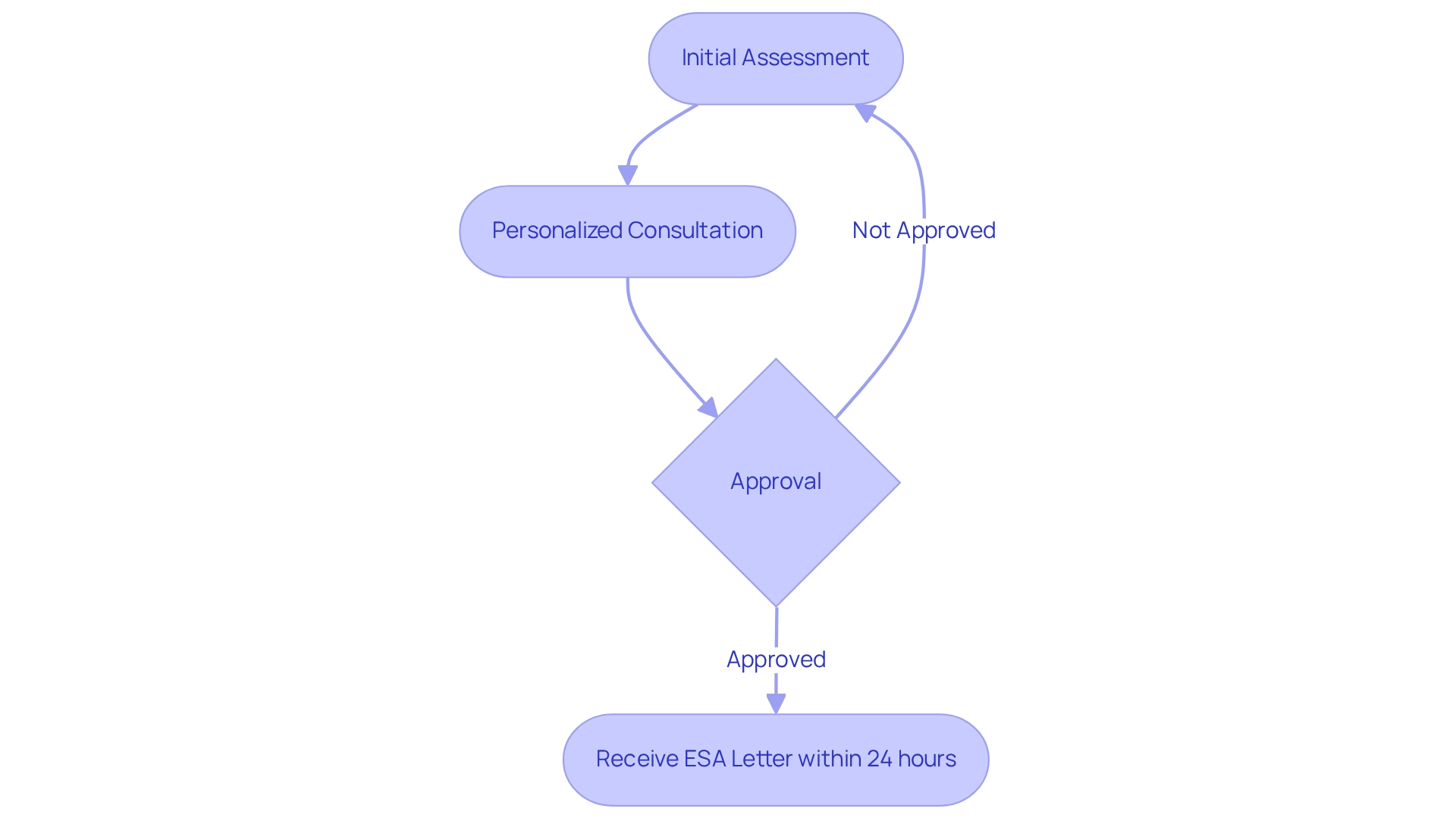
California Fair Housing Act: Protections for Emotional Support Animals
The California Fair Housing Act (CFHA) offers vital protection for individuals who rely on emotional assistance animals (ESAs), in accordance with emotional support animal laws California, ensuring that landlords cannot deny housing based solely on a tenant’s need for an ESA, even in properties with no-pet policies. This essential legislation empowers those with documented mental health conditions to live alongside their ESAs, fostering an environment that nurtures mental health and well-being.
Individuals with ESAs are entitled under the CFHA to request reasonable accommodations in their housing arrangements. This right to reside with their animals in pet-restricted housing is crucial for those who depend on the companionship of their ESAs to navigate challenges such as anxiety, depression, or PTSD. Unfortunately, housing discrimination against ESA holders remains a significant concern in California, with many individuals sharing their struggles in finding suitable accommodations. For instance, studies reveal that approximately 30% of individuals with ESAs have faced discrimination when seeking housing.
Experts in housing law stress the importance of the CFHA in safeguarding the rights of ESA holders, under the emotional support animal laws California, emphasizing that landlords must engage in a collaborative process to evaluate accommodation requests. As noted by Wellness Wag, “The Fair Housing Act blocks discrimination against leaseholders because of any disabilities.” It is important to understand that while service dogs enjoy full public access rights under the Americans with Disabilities Act (ADA), ESAs do not share the same privileges in public spaces. However, there are successful instances where ESA owners have advocated for their rights under the CFHA, resulting in favorable housing arrangements that honor their needs. A recent case highlighted an ESA caregiver who skillfully negotiated with a landlord to allow their pet in a previously no-pet property, exemplifying the law’s practical application.
Looking ahead to 2025, updates to the CFHA continue to enhance protections for ESA caretakers, reflecting a growing recognition of the importance of emotional support animal laws California in promoting mental well-being. This legislation not only safeguards the rights of ESA owners but also encourages a more inclusive approach to housing, ensuring that individuals can live with their assistance animals without the fear of discrimination.
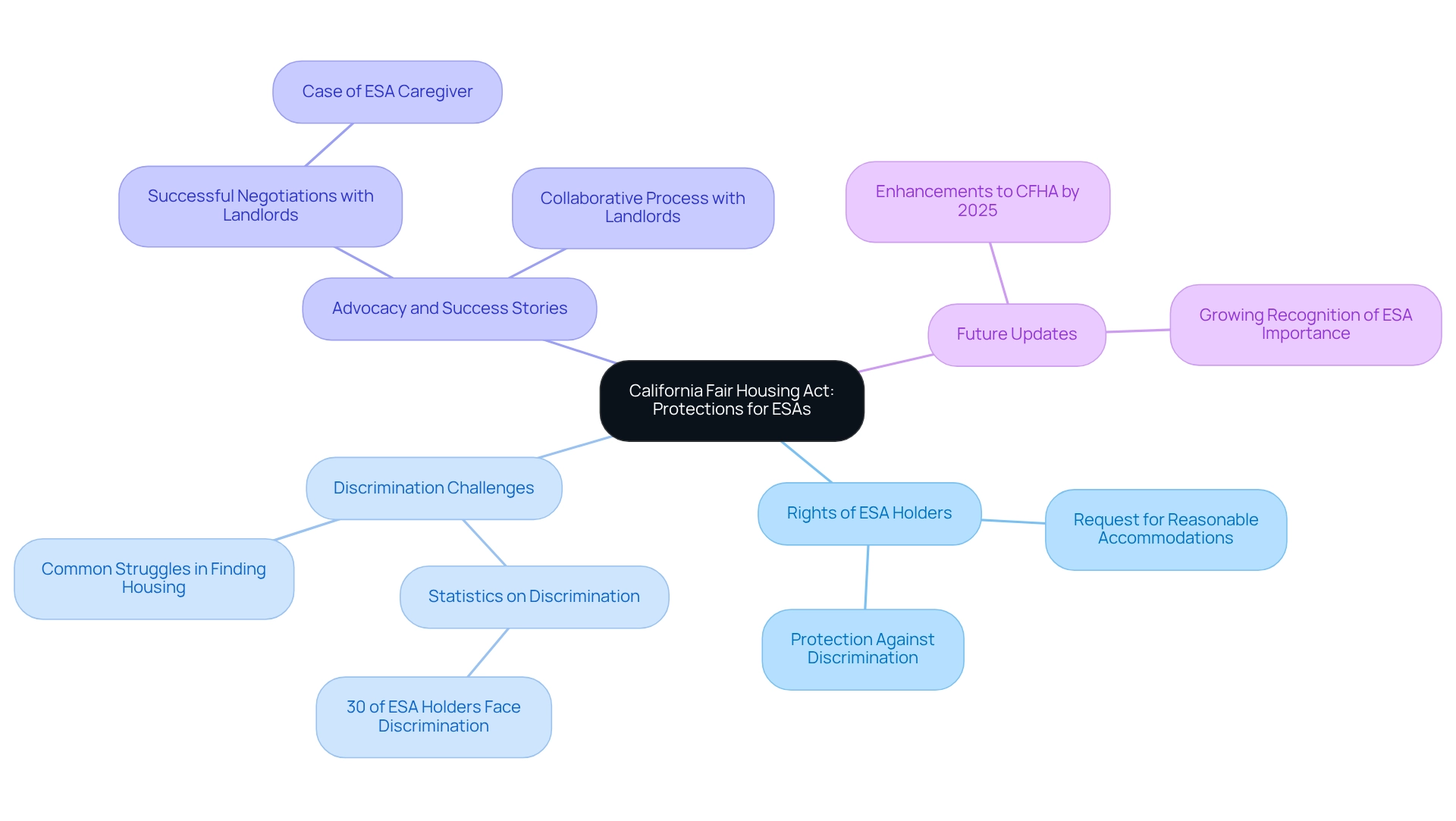
Service Animals vs. Emotional Support Animals: Key Legal Differences
In California, the legal definitions of service animals and emotional support animal laws California are distinctly different, leading to significant implications for access rights. Service animals, specifically trained to assist individuals with disabilities, enjoy broader access rights under the Americans with Disabilities Act (ADA). This includes entry into public spaces where pets are typically prohibited. While there is no legal requirement for service dogs to be certified or registered, obtaining certification from recognized organizations can lend credibility and ensure that the service dog has received proper training. This certification strengthens the rights of individuals with service dogs, who are permitted to bring their service animals into public areas, including restaurants, stores, libraries, and public transportation. Additionally, service dog handlers are entitled to housing accommodations, even in areas where pets are typically restricted.
Conversely, ESAs, which provide comfort and emotional support without specialized training, do not share the same public access rights. As a result, ESAs may face restrictions in certain public areas, underscoring the importance for ESA custodians to understand these legal distinctions. Have you ever felt the frustration of not being able to bring your emotional support animal with you? You’re not alone.
Recent research indicates that around 75% of ESA guardians are unaware of the legal distinctions between service animals and ESAs, which can lead to challenges in advocating for their rights. In California, legal specialists stress the importance for ESA caretakers to understand emotional support animal laws California, especially considering the evolving landscape of emotional support pet laws. For instance, recent modifications to the Air Carrier Access Act have made air travel more challenging for ESA handlers, as ESAs are increasingly viewed like typical pets, resulting in a rise in incidents involving animals during transport. A case study titled “Risks ESAs Face in Air Travel” highlights these complications, emphasizing the need for better protections for ESAs during air travel.
Comprehending these legal nuances is vital for ESA caretakers, especially in managing housing limitations and travel arrangements. With the percentage of ESA owners aware of their legal rights remaining low, education and advocacy are crucial. This ensures that individuals can effectively utilize the emotional support their companions provide while adhering to existing laws. As Kathryn Anderson, a senior marketing associate and pet care advocate, remarked, “The HABRI study revealed remarkable findings that endorse the ownership of pets for emotional assistance,” emphasizing the significance of acknowledging and advocating for these rights. Remember, you are not alone in this journey, and there are resources available to help you navigate these challenges.
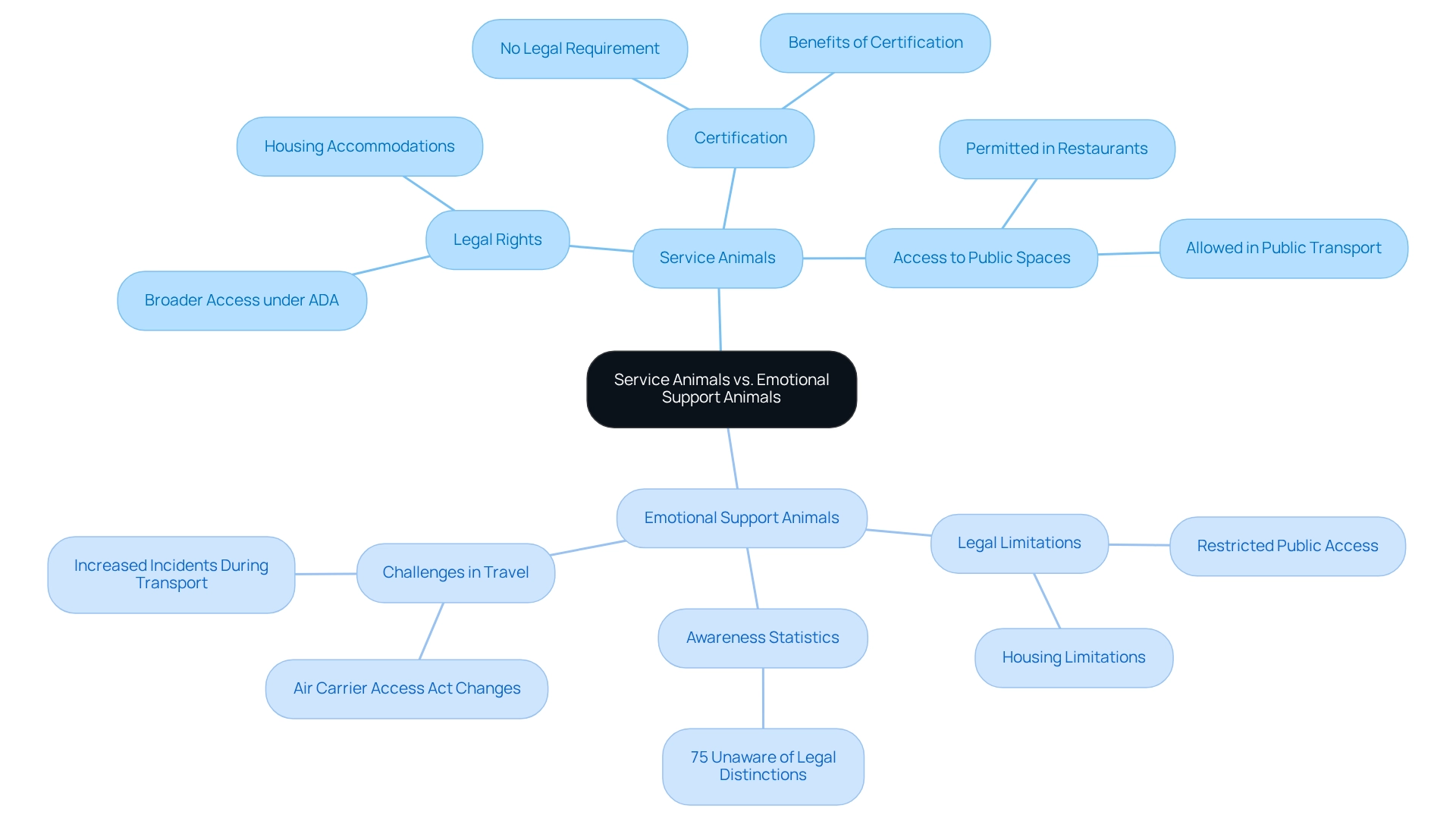
California’s New ESA Regulations: What You Need to Know
In 2025, California made significant changes to emotional support animal laws through Assembly Bill 468. This important legislation requires individuals seeking an ESA letter to establish a minimum 30-day relationship with a licensed mental health professional (LMHP). By doing so, the law aims to ensure that ESA letters are issued based on genuine needs, helping to reduce the prevalence of fraudulent claims. Additionally, it strengthens verification processes for housing providers, enabling them to authenticate ESA documentation effectively. These improvements are designed to protect both ESA possessors and housing providers, fostering a more open and fair environment.
For those who believe they qualify for an emotional assistance creature, obtaining an ESA letter online can simplify the process. As emphasized by Wellness Wag, the ESA letter must be on the LMHP’s official letterhead, include their licensing information, and detail the necessity of the ESA for the individual’s well-being. Furthermore, under the Fair Housing Act, emotional support animal laws ensure that ESA owners have the right to keep their pets in housing situations, even if the property has a no-pet policy, provided they possess the necessary ESA documentation. The impact of Assembly Bill 468 is expected to resonate throughout California, as it sets a precedent for the issuance of ESA letters. This ensures that individuals with valid mental health needs can access the assistance they require without facing unnecessary obstacles. This legislation not only highlights the importance of emotional assistance creatures in supporting mental well-being but also enhances housing access for students and others who rely on these essential companions under the emotional support animal laws.
To obtain an ESA letter, consider following these steps:
- Schedule an appointment with a licensed mental health professional
- Discuss your mental health needs and the role an ESA could play in your well-being
- If deemed appropriate, request the ESA letter during your consultation
- Ensure the letter is on official letterhead and includes necessary details
By following this procedure, students with disabilities can secure the assistance they need to thrive in their educational environments.
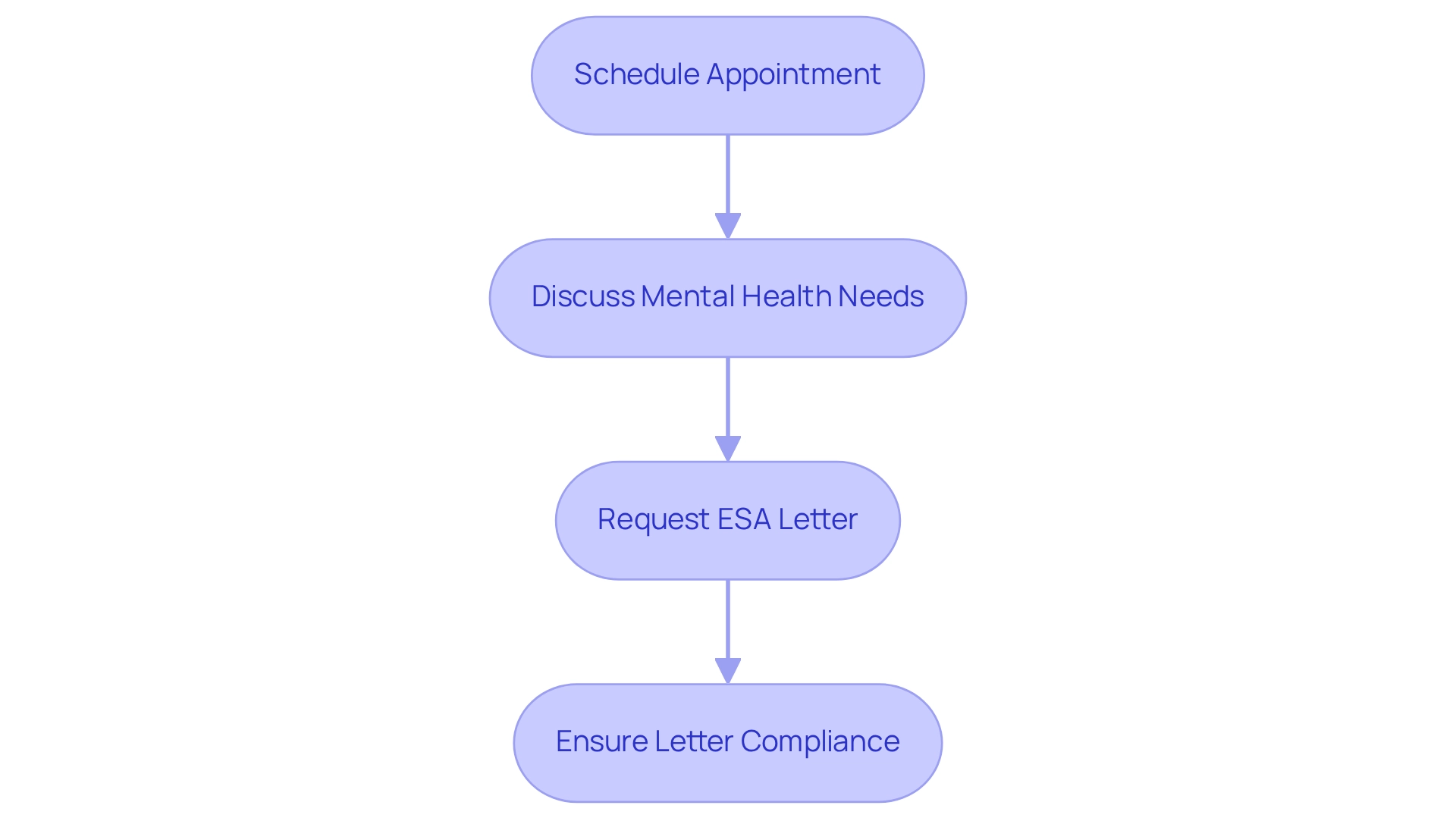
Housing Rights for ESA Owners: Understanding Your Protections
In California, emotional support animal laws California grant individuals with emotional support animals (ESAs) important housing rights designed to protect them from discrimination. The Fair Housing Act mandates that landlords provide reasonable accommodations for tenants with ESAs, in compliance with emotional support animal laws California, allowing these beloved animals in properties that typically enforce no-pet policies. To access these vital protections, tenants must present a valid ESA letter issued by a licensed mental health professional. Crucially, emotional support animal laws California prohibit landlords from imposing additional fees or deposits for ESAs, removing financial barriers that could otherwise hinder access to housing for individuals with disabilities.
Recent developments in 2025 have shed light on the ongoing challenges and successes in advocating for ESA accommodations within no-pet policies. Legal experts emphasize that understanding emotional support animal laws California is essential for ESA holders, empowering them to confidently face housing challenges. According to the U.S. Department of Housing and Urban Development, “You should also be diagnosed by a state certified LMHP,” underscoring the importance of valid documentation. Encouragingly, statistics indicate that compliance among landlords regarding emotional support animal laws California has improved, with approximately 75% of landlords adhering to the legal requirements in 2025. This progress highlights the significance of continuous advocacy and awareness regarding emotional support animal laws California, ensuring that individuals can secure housing that meets their emotional assistance needs.
Additionally, individuals can now conveniently obtain an ESA letter online through Wellness Wag’s telehealth services, enhancing accessibility to necessary documentation without the need for an in-person appointment. This streamlined process not only simplifies the acquisition of valid ESA letters but also aids ESA holders in understanding their rights and responsibilities. We invite you to explore our FAQs for common questions regarding ESA rights and the process of obtaining letters, as we are here to support you. Client testimonials reflect the effortless experience of obtaining ESA letters through Wellness Wag, showcasing the satisfaction of our users. This comparative perspective on accountability and documentation requirements may resonate with California ESA owners, as we remain focused on ensuring clarity and relevance to their specific needs.
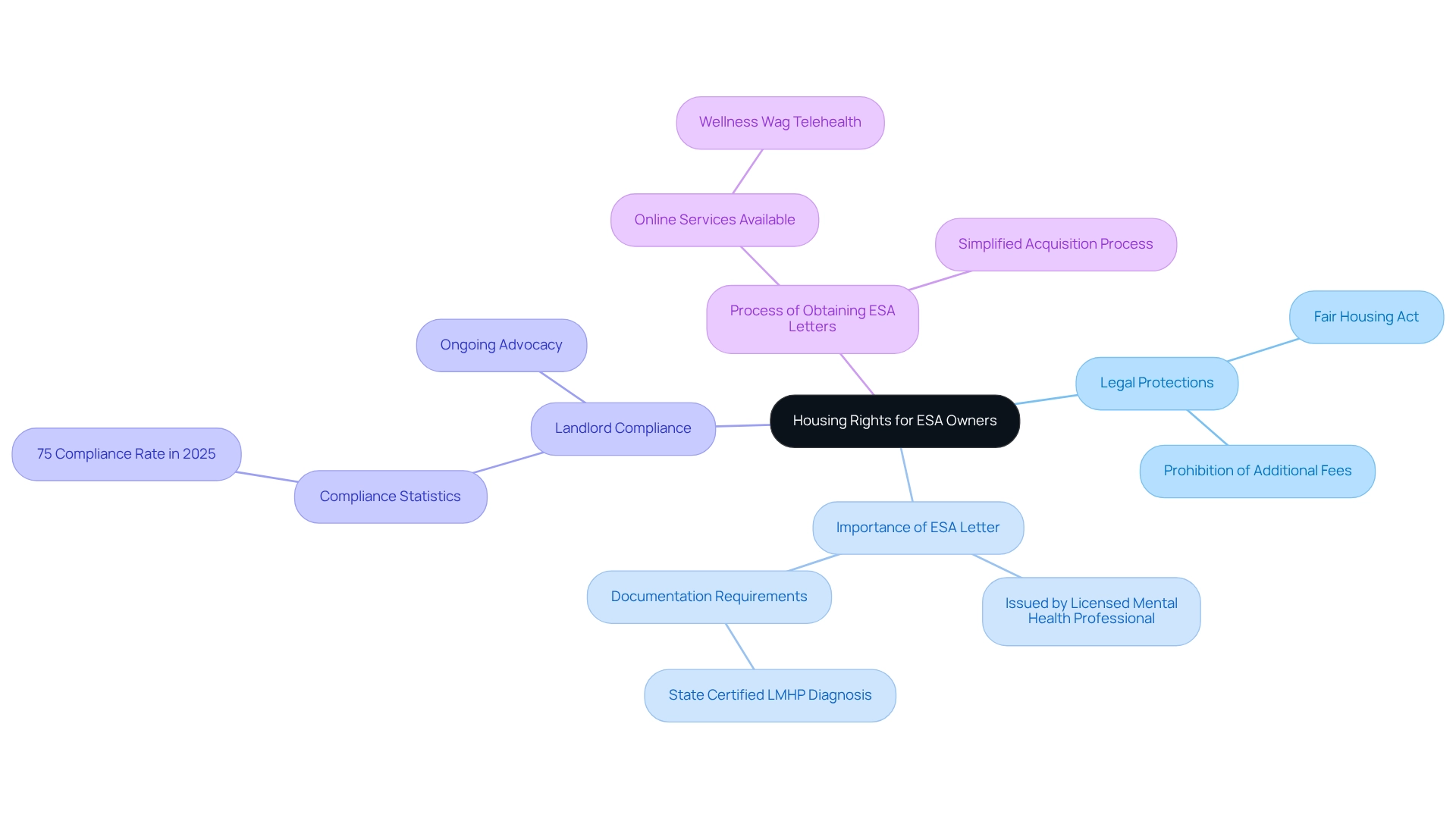
Obtaining a Valid ESA Letter: Legal Requirements in California
In California, the journey to obtaining a valid Emotional Support Animal (ESA) letter begins with an evaluation by a licensed mental health professional. This assessment is crucial, as it confirms that the individual is experiencing a qualifying mental health condition, such as anxiety, depression, or PTSD, which makes the companionship of an ESA necessary. The professional will then provide a letter containing essential details: the patient’s name, the professional’s license information, and a clear statement outlining the individual’s need for an ESA.
For many students, ESAs can significantly alleviate symptoms associated with mental health issues, offering comfort and assistance during challenging times. This emotional support is vital for students navigating the pressures of academic life and personal challenges, ensuring they can fully engage in their educational experience.
To comply with emotional support animal laws California, it is essential that the letter is issued by a licensed provider in California. This requirement ensures that the document meets state laws, including emotional support animal laws California, thereby safeguarding the individual’s rights under the Fair Housing Act and other relevant regulations. Notably, starting in 2025, healthcare professionals in California will be required to establish a 30-day client-provider relationship before issuing an ESA letter, underscoring the importance of a thorough evaluation process.
Additionally, valid ESA letters must meet specific criteria, including the professional’s signature and contact information, to be legally recognized. This documentation is particularly important for individuals facing housing restrictions or travel challenges due to their mental health conditions. For instance, while emotional assistance animals are not automatically allowed in hotels unless they are pet-friendly, having valid ESA documentation can significantly increase the likelihood of being granted entry, although the final decision rests with hotel management.
It is also important to note that federal law changes in 2021 removed ESA protections under the Air Carrier Access Act (ACAA), impacting travel with emotional assistance animals. Furthermore, California legislation does not limit the number of emotional assistance animals one may possess, as long as they are properly documented.
Understanding the emotional support animal laws California is essential for residents who are seeking the emotional benefits of pet companionship, ensuring they are well-prepared to navigate the complexities of ESA regulations. Wellness Wag offers a convenient online method for acquiring authentic ESA letters through telehealth services, making it easier for individuals to access the support they need. As noted by the U.S. Department of Housing and Urban Development, “If you possess an emotional or mental disability and believe you may be eligible for an emotional assistance animal, you need to obtain an official letter to guarantee you receive the legal protections you’re entitled to.

Traveling with ESAs: Legal Considerations Under California Law
Traveling with emotional support animals in California can be quite challenging due to the emotional support animal laws California, as it involves navigating a complicated legal framework. For those who rely on these beloved companions, the emotional toll can be significant. While the Fair Housing Act provides robust protections for ESAs in housing situations, their rights during travel are more nuanced, which can lead to anxiety and uncertainty. Unlike service creatures, airlines are not required to accommodate emotional assistance animals, resulting in diverse policies among various carriers. For instance, Air Canada no longer acknowledges emotional assistance creatures, which may leave travelers feeling vulnerable and dependent on psychiatric service dogs (PSDs) instead.
To travel with a PSD, individuals must present proper documentation, including:
- A completed U.S. DOT form
- Notification to the Medical Assistance Desk at least 48 hours before the flight
- A PSD letter to ensure a smoother check-in process
It’s important to note that pet fees may vary based on flight type, and while there are no breed restrictions for service dogs, snub-nosed breeds face limitations. Additionally, pet carriers must meet specific size guidelines, and only one cat or small dog is allowed, provided they meet age and health requirements.
Recent updates have prompted airlines to reevaluate their policies concerning ESAs, especially due to events that have heightened safety worries, such as a flight attendant needing stitches after being bitten by an emotional assistance creature. This situation underscores the importance of understanding both the legal rights and the practical implications of traveling with an ESA, especially in light of emotional support animal laws California. As Bob McCullough wisely notes, “This is not a ‘rubber stamp’ process, as the therapists are bound by professional ethical guidelines and the State Licensure Board to verify the medical need for the issuance of legally-enforceable ESA documentation.”
California’s emotional support animal laws California also stress the need for ESA handlers to advocate for their rights under the Air Carrier Access Act. While this act does not ensure the same level of access as for service creatures, it still offers a framework for requesting accommodations. As travelers resume flying, many may feel hesitant to leave their pets behind, making it essential to stay informed about current airline policies and legal considerations surrounding ESAs. By reviewing airline policies prior to reserving flights and confirming they possess their ESA documentation on hand, ESA guardians can more effectively manage their travel experiences and ensure their emotional companions travel with them safely. Remember, you are not alone in this journey; support is available to help you navigate these challenges.
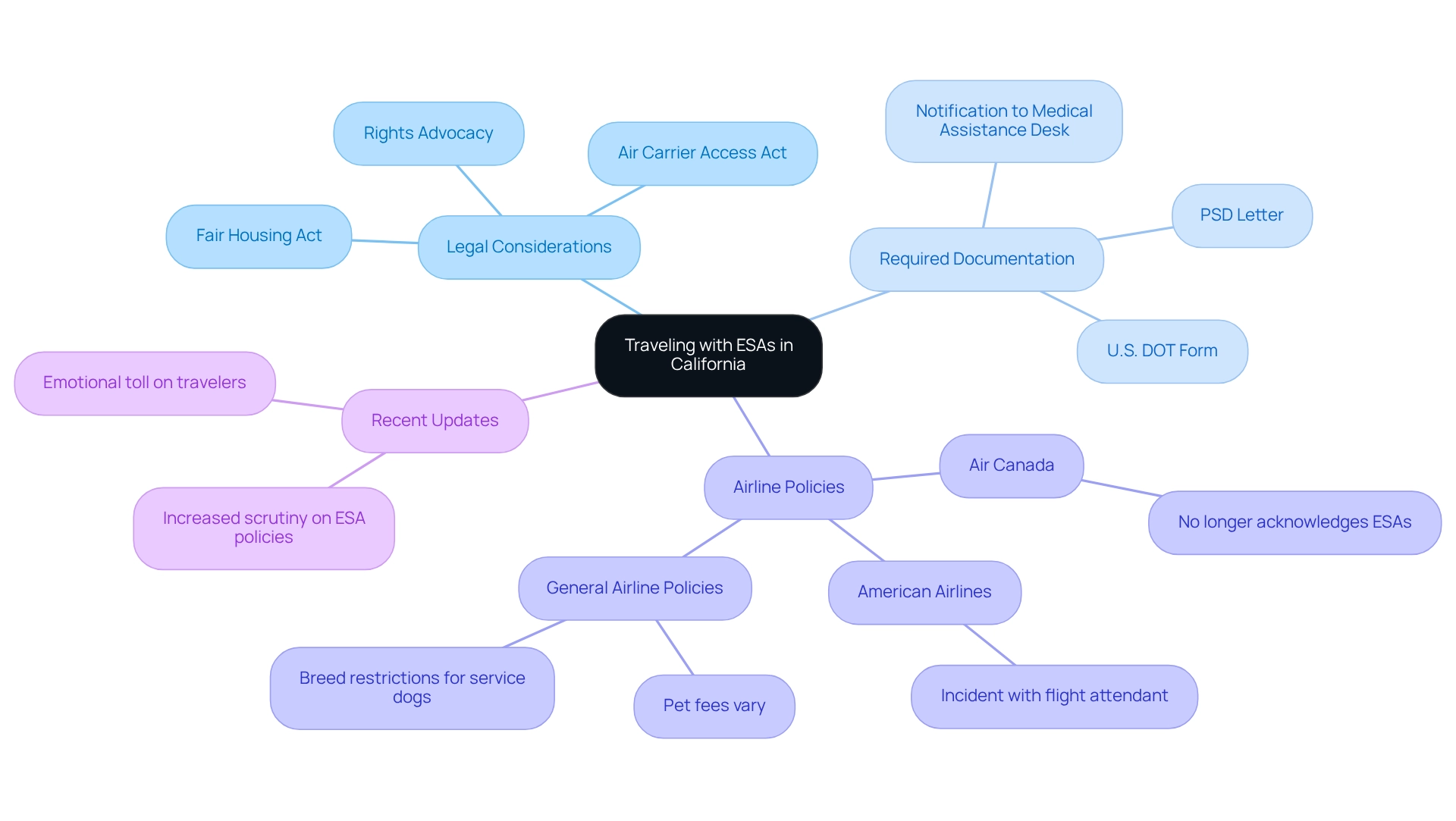
Handler Responsibilities: What ESA Owners Must Know
Understanding the responsibilities of an emotional support animal (ESA) caregiver is vital for fostering a harmonious relationship with landlords and the community in accordance with emotional support animal laws California. ESAs offer crucial emotional support to individuals with disabilities, alleviating symptoms associated with their conditions. As guardians of these animals, it is essential for ESA caregivers to ensure their pets are well-mannered, clean, and non-threatening. This responsibility includes providing proper training, socialization, and care for the animal. In California, recent statistics reveal that only about 60% of ESA caretakers meet training standards, indicating a significant area for improvement. This highlights the importance of prioritizing proper training to uphold their rights and privileges.
Additionally, according to emotional support animal laws California, ESA holders must be prepared to present documentation confirming their animal’s status as an ESA when requested by landlords or authorities. This documentation is not only crucial for legal compliance but also for advocating the rights of ESA holders under the Fair Housing Act and emotional support animal laws California. One tenant, Dawn, expressed her concerns, stating, “I would also like to know. I had a tenant move in, no pets allowed,” which underscores the challenges faced by ESA individuals navigating housing limitations.
By fulfilling these obligations, ESA caregivers help foster a positive perception of emotional support animals, which is essential for maintaining access to housing under emotional support animal laws California and ensuring the well-being of their pets. Expert insights emphasize that proper training and care are foundational to a successful ESA partnership. Animal behaviorists note that well-trained ESAs are less likely to cause disturbances, thereby minimizing potential conflicts with landlords and neighbors.
As the landscape of emotional support animal laws California continues to evolve, particularly with recent changes to the Air Carrier Access Act complicating air travel for ESA handlers, understanding and adhering to these responsibilities is more critical than ever. The documented risks faced by ESAs during air travel highlight the need for enhanced safeguards and compliance from caregivers, ensuring they can effectively manage both housing and travel situations.
Key Responsibilities for ESA Owners:
- Ensure your ESA is well-behaved and clean.
- Provide adequate training and socialization for your pet.
- Keep documentation verifying your ESA’s status readily available.
- Understand your rights under the Fair Housing Act, particularly the emotional support animal laws in California, to advocate for yourself effectively.
By following these guidelines, ESA caregivers can create a nurturing environment for themselves and their beloved pets.
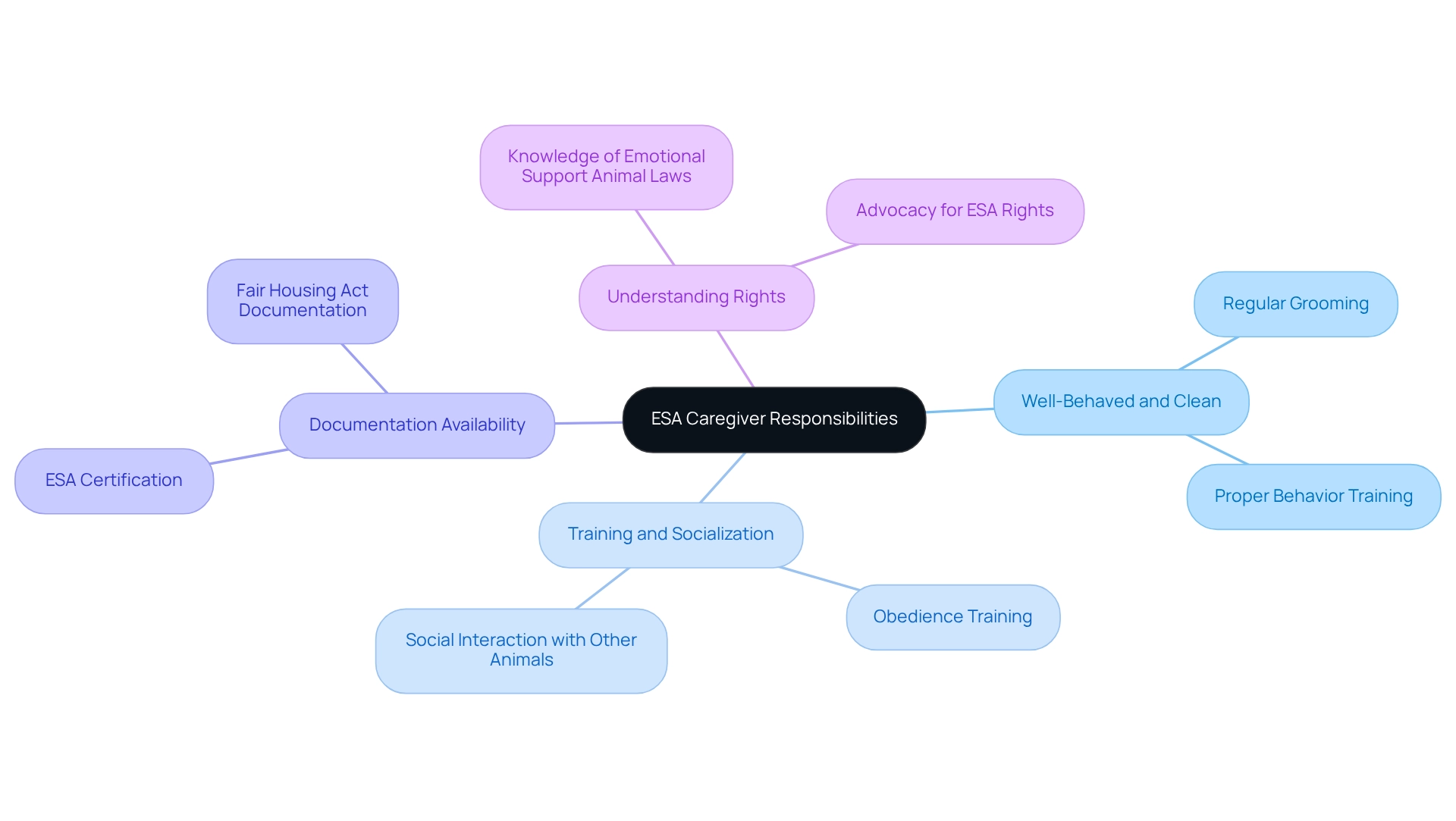
Facing Discrimination: Challenges for ESA Owners in California
Despite existing emotional support animal laws in California, individuals with emotional support animals (ESAs) often face significant challenges. Many landlords are unaware of the emotional support animal laws California, which leads to unnecessary restrictions that can feel isolating and frustrating. This situation is made worse by the societal stigma surrounding mental health, which can contribute to negative perceptions of those who care for ESAs. Recent statistics show that a considerable percentage of ESA possessors report distressing experiences with landlords, underscoring the urgent need for awareness and education about their rights.
In 2025, reports indicate that around 40% of possessors under emotional support animal laws California encountered discrimination, with many struggling to find suitable housing. This discrimination often stems from misunderstandings about the role of ESAs, which provide emotional support rather than specialized training. In contrast, service dogs, protected under the Americans with Disabilities Act (ADA), enjoy full public access rights and typically undergo specific training. While there is no legal requirement for service dogs to be certified or registered, obtaining certification can lend credibility and ensure that the service dog has received proper training. This distinction is vital, as service dog handlers can bring their dogs into public spaces and are entitled to housing accommodations, even in areas where pets are usually restricted. Furthermore, studies reveal that emotional assistance animals (ESAs) can alleviate symptoms of mental health challenges and improve physical well-being by reducing blood pressure and heart rate, highlighting their essential role in the lives of their caregivers.
Advocacy is crucial in addressing discrimination. Successful campaigns have demonstrated how collective action can raise awareness and inspire change. Organizations dedicated to mental well-being and advocacy for animals provide invaluable resources and support for ESA caregivers facing these hardships. As Maya Angelou beautifully expressed, “And still, I rise,” reminding us of the resilience needed in adversity. It is vital for ESA guardians to understand their rights according to emotional support animal laws California and to advocate for themselves when facing discrimination, ensuring they receive the support they deserve.
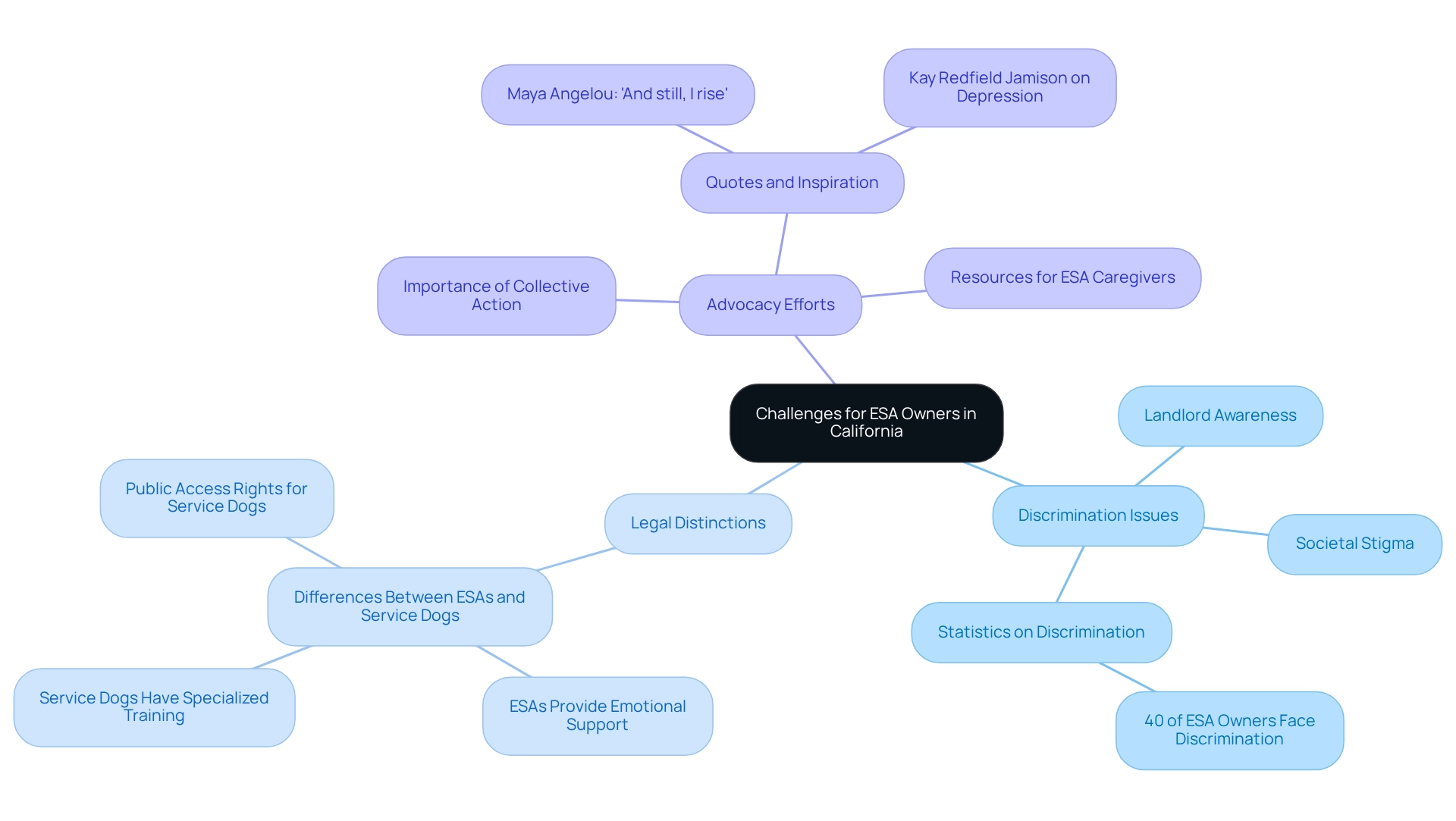
Advocating for Your ESA Rights: Navigating California’s Legal Framework
Championing your rights as an emotional support animal (ESA) owner in California involves not just understanding the emotional support animal laws California, but also embracing a proactive approach. It’s important to recognize key laws, such as the Fair Housing Act and emotional support animal laws California, as the foundation of your rights. In 2025, advocacy organizations in California have increased their efforts, reflecting a growing recognition of the vital role emotional assistance creatures play in mental health treatment and their ability to alleviate symptoms for individuals with disabilities.
When you encounter challenges, effective communication with landlords becomes essential. Providing necessary documentation, including a valid ESA letter, can help clarify your rights and responsibilities. Legal experts emphasize that understanding emotional support animal laws California is crucial for navigating potential disputes. Jonalyn Dionio, a legal advocate, notes that ‘understanding and overcoming barriers related to housing regulations and travel restrictions remains essential for ensuring individuals obtain the assistance they require.’
To ensure your ESA is accommodated in student housing, it’s beneficial to familiarize yourself with specific guidelines, such as the requirement for a valid ESA letter and any additional documentation your institution may request. Joining advocacy groups can significantly strengthen your position. These organizations not only provide resources but also create a platform for collective action, which has proven effective in recent legal challenges. Staying informed about emotional support animal laws California will empower you to advocate effectively for your rights, ensuring that your emotional support animal remains a cherished part of your life, promoting equal opportunity to fully enjoy residential life.
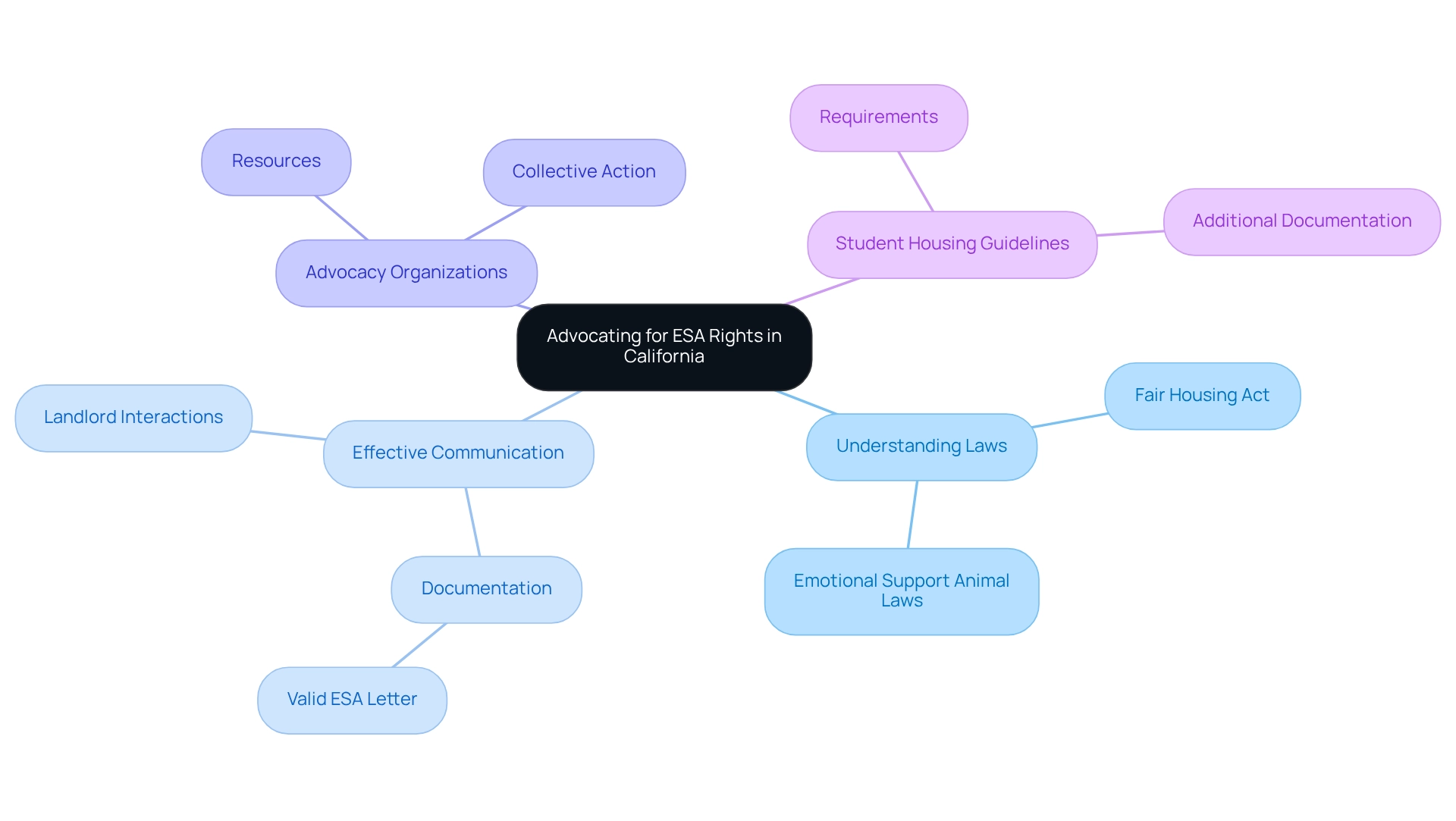
Conclusion
Navigating the landscape of emotional support animals (ESAs) in California can be a deeply personal journey for those seeking the comfort and companionship these animals provide. With recent legislative changes, such as Assembly Bill 468, the process for obtaining a legitimate ESA letter has become more structured. This ensures individuals have access to the support they need while also addressing concerns about fraudulent claims. Understanding the legal distinctions between service animals and ESAs is vital, as it directly affects access rights and housing protections under laws like the Fair Housing Act.
ESA owners in California enjoy specific rights designed to protect them from discrimination in housing situations, allowing them to live with their animals even in pet-restricted properties. Yet, the journey is not without its hurdles; many ESA owners continue to face discrimination due to misconceptions about their animals’ roles and the stigma surrounding mental health. Advocacy and education are crucial in addressing these challenges, as approximately 40% of ESA owners reported experiencing discrimination in 2025.
Ultimately, being informed about the legal framework and advocating for one’s rights is essential for ESA owners. By understanding their responsibilities and the protections afforded to them, individuals can navigate the complexities of housing and travel with confidence. Support services like Wellness Wag play a critical role in facilitating access to valid ESA letters, ensuring that individuals can focus on their mental well-being while enjoying the companionship of their emotional support animals. As California continues to evolve in its recognition of the importance of emotional support, staying informed and proactive will empower ESA owners to thrive in their daily lives.
Frequently Asked Questions
What is the purpose of Emotional Support Animal (ESA) letters?
ESA letters provide documentation for individuals dealing with mental health issues, allowing them to live with their emotional support animals in housing situations that may otherwise restrict pets.
How does the process of obtaining an ESA letter work at Wellness Wag?
The process begins with a brief assessment to determine eligibility, followed by a personalized consultation with licensed medical professionals. Once approved, clients receive their official ESA letter within 24 hours.
What should clients do if they do not receive a confirmation email after placing an order?
Clients should check their spam folder for the confirmation email or reach out to Wellness Wag directly for assistance.
What protections does the California Fair Housing Act (CFHA) provide for ESA holders?
The CFHA protects individuals who rely on ESAs by ensuring that landlords cannot deny housing based solely on a tenant’s need for an ESA, even in no-pet properties.
Are there any recent trends regarding the issuance of ESA letters in California?
Yes, in 2025, there was a reported increase of over 30% in the issuance of ESA letters compared to the previous year, indicating a growing recognition of the emotional support that animals provide.
What is Assembly Bill 462, and how does it relate to ESA letters?
Assembly Bill 462 establishes stricter regulations on the issuance of ESA letters to protect the rights of legitimate ESA possessors and to prevent fraudulent claims, ensuring thorough evaluations by licensed professionals.
What are the differences between service animals and emotional support animals in California?
Service animals are specifically trained to assist individuals with disabilities and have broader access rights under the ADA, while ESAs provide comfort and emotional support without specialized training and do not have the same public access rights.
What challenges do ESA owners face regarding housing and discrimination?
Approximately 30% of individuals with ESAs have experienced housing discrimination. The CFHA emphasizes the need for landlords to collaborate with ESA holders to evaluate accommodation requests.
How does Wellness Wag ensure customer satisfaction?
Wellness Wag offers a money-back guarantee and flexible payment plans starting as low as $32.25, demonstrating their commitment to customer satisfaction.
What are some benefits of having an ESA for individuals facing mental health challenges?
Many clients report reduced loneliness and improved stability, as well as enhanced security and peace of mind, which can help manage stress and improve overall mental health.
Certify Your Emotional Support Animal Today

Why You Can Rely on Us?
At Wellness Wag, we believe your pet deserves care rooted in both science and compassion. Each article is carefully researched, written in clear language for pet owners, and then reviewed by qualified professionals to ensure the information is evidence-based, current, and practical for real-life care. Our goal is to help you feel confident in making informed decisions about your pet’s health and well-being.
Reviewed by
Angela Morris, MSW, LCSW
Angela is a licensed clinical social worker with 20 years of experience in patient advocacy and community mental health. She has assisted numerous clients with ESA evaluations and brings a deep understanding of disability accommodations, ensuring that all information is accurate, supportive, and practical.

Written by :
Lena Park
Last Updated :
May 6, 2025












